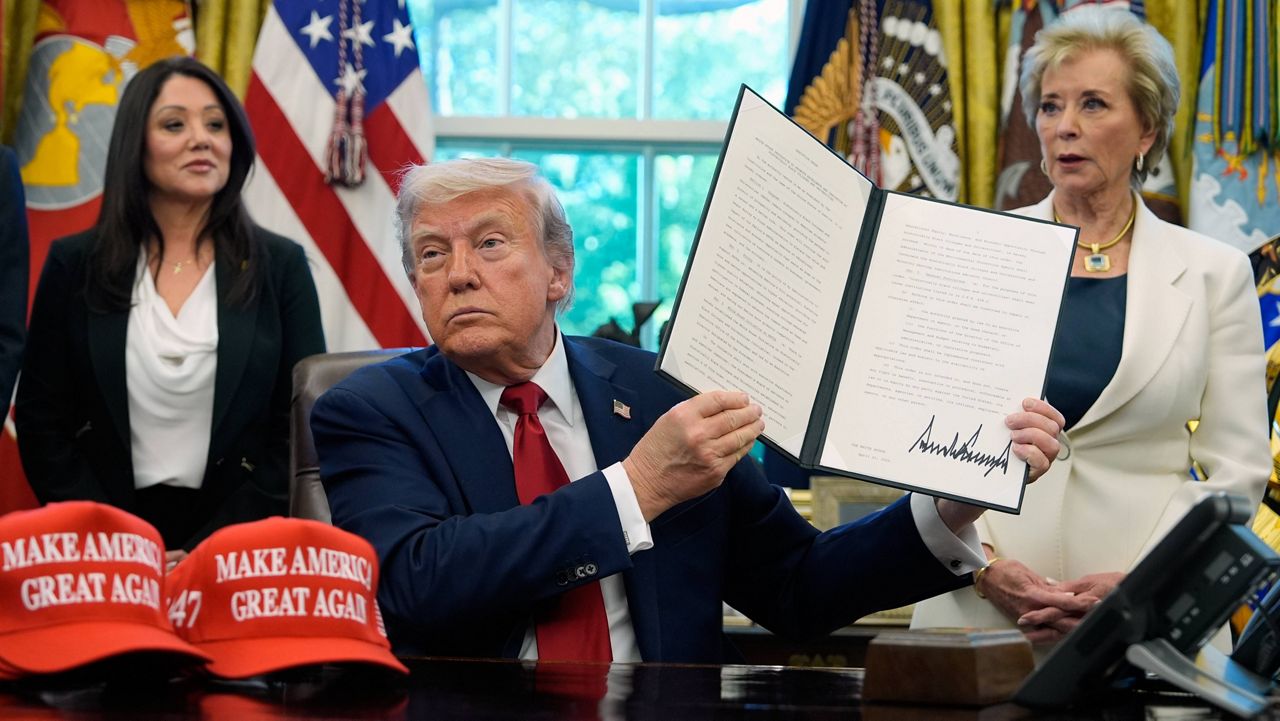The House of Representatives on Tuesday passed on a two-pronged plan to keep the government funded, the first step toward averting a government shutdown.
The plan, unveiled by Speaker Mike Johnson, R-La., on Saturday, extends funding for some programs through mid-January and others through early February. It faced considerable opposition from far-right conservative lawmakers, but Democrats helped give the bill a major boost.
Ninety-three Republicans voted against the bill, while 209 Democrats joined 127 members of the House GOP to send the measure to the Senate. The final vote was 336-95, with two Democrats also voting against the bill.
Tuesday's vote was a marked departure from the chaos of September's eleventh hour vote to stave off a government shutdown – and a marked departure of the tumultuous day in Washington which saw a Tennessee Republican accuse former House Speaker Kevin McCarthy, R-Calif, of elbowing him, and, across the Capitol, a Republican senator challenging the head of the Teamsters union to a fight during a hearing.
The vote put on display Speaker Johnson's willingness to buck the far-right flank of his caucus to fund the government, a move that cost his predecessor McCarthy his position last month.
The proposal funds some federal agencies through Jan. 19, while others are funded through Feb. 2. It does not include the demands of his conference — namely steep spending cuts and border security proposals — nor does it contain the funding requested by the Biden administration to aid Israel or Ukraine. Instead, the bill, known as a continuing resolution, or CR, extends government funding at current levels, another major sticking point for hardline conservatives. It would give lawmakers in the House and Senate time to hash out an agreement on a full-year spending bill.
Johnson acknowledged that while it was not the outcome he or his conference hoped for, it was the best Republicans could do given their three-seat majority in the House – particularly considering the necessity to avert a shutdown.
"I want to cut spending right now and I would like to put policy riders on this," Johnson said earlier Tuesday at a press conference. "But when you have a three-vote majority as we do right now, we don't have the votes to be able to advance that right now. What we need to do is avoid the government shutdown."
"Making sure that government stays in operation is a matter of conscience for all of us," said the Louisiana Republican. "We owe that to the American people."
Shortly before the vote Tuesday, House Democratic leadership announced it would support the GOP's bill, giving it a major boost of support.
"House Democrats have repeatedly articulated that any continuing resolution must be set at the fiscal year 2023 spending level, be devoid of harmful cuts and free of extreme right-wing policy riders," a statement from House Democratic Leader Hakeem Jeffries, D-N.Y., Whip Katherine Clark, D-Mass., Caucus Chair Pete Aguilar, D-Calif., and Vice Chair Ted Lieu, D-Calif., reads, saying that the House GOP's bill "meets that criteria."
"We will support it," they continued, urging Republicans to come together on President Joe Biden's supplemental request to provide aid to Israel, Ukraine and the U.S.-Mexico border, as well as work with the Senate on full-year spending bills.
Another prominent figure in the party, Congressional Progressive Caucus Chair Pramila Jayapal, D-Wash., called it "a very big win" that the continuing resolution is set at fiscal year 2023 spending levels.
California Republican Rep. Mike Garcia called the situation "not ideal," but that it had to happen.
"We got to keep the government open, and we've got to keep paying our troops," Garcia said. "This is far from perfect right now, the situation that we're in — we lose about $2 billion a week in concurrency and efficiency losses with the DoD bill when we're in a CR, but a shutdown is a far worse world to be in."
But the far-right House Freedom Caucus on Tuesday put out a statement opposing the measure, bemoaning the fact that it "contains no spending reductions, no border security, and not a single meaningful win for the American people."
"Republicans must stop negotiating against ourselves over fears of what the Senate may do with the promise ‘roll over today and we’ll fight tomorrow,'" the group's statement reads. "While we remain committed to working with Speaker Johnson, we need bold change."
"I think it’s a very big mistake," said Texas Rep. Chip Roy, a prominent member of the Freedom Caucus.
Despite the conservative outcry on the funding bill, Johnson told reporters at a press conference Tuesday that he is "not concerned" about threats to his speakership for following a similar path that McCarthy did to avert a shutdown.
"Kevin should take no blame for that. Kevin was in a very difficult situation when that happened. This is a different situation," Johnson said, praising the two-pronged path forward they established to avert a shutdown.
The package won the endorsement of the Senate's Democratic and Republican leaders on Monday, signaling smooth passage through the upper chamber.
"House Republicans have produced a responsible measure that will keep the lights on, avoid a harmful lapse in government funding, and provide the time and space to finish that important work," Senate Minority Leader Mitch McConnell, R-Ky., said Monday.
On Monday evening, Senate Majority Leader Chuck Schumer, D-N.Y., announced the chamber would "delay" a planned procedural vote on its own CR "to allow the House to move first with their proposal."
"I have said since the very beginning that bipartisanship is the only way to avoid a government shutdown, and for that reason I am heartened that the bill Speaker Johnson is advancing omits the sort of devastating cuts that are non-starters for Democrats," Schumer said on the Senate floor Monday. "The Speaker’s proposal is far from perfect, but the most important thing is that it refrains from making steep cuts while avoiding a costly government shutdown."
"For now, I am pleased that Speaker Johnson seems to be moving in our direction by advancing a CR that does not include the highly partisan cuts that Democrats have warned against," Schumer said.
“I hope the Speaker continues to acknowledge that he will need Democratic votes in both chambers if he wants to avoid a government shutdown," the New York Democrat warned. "He needs to stay away from poison pills and steep hard-right cuts to make that happen."
And President Biden notably did not say that he would necessarily veto the measure should it reach his desk.
"I’m not going to make a judgment on what I’d veto and what I’d sign," the president said Monday. "Let’s see what they come up with."
If approved, passage of the continuing resolution would be a less-than-triumphant capstone to the House GOP's first year in the majority. The Republicans have worked tirelessly to cut federal government spending only to find their own GOP colleagues unwilling to go along with the most conservative priorities. Two of the Republican bills collapsed last week as moderates revolted.
Instead, the Republicans are left funding the government essentially on autopilot at the levels that were set in bipartisan fashion at the end of 2022, when Democrats had control of Congress but the two parties came together to agree on budget terms.
All that could change in the new year when 1% cuts across the board to all departments would be triggered if Congress failed to agree to new budget terms and pass the traditional appropriation bills to fund the government by springtime.
The 1% automatic cuts, which would take hold in April, are despised by all sides — Republicans say they are not enough, Democrats say they are too steep and many lawmakers prefer to boost defense funds. But they are part of the debt deal McCarthy and Biden struck earlier this year. The idea was to push Congress to do better.
The legislation also extends farm bill programs through September, the end of the current fiscal year. That addition was an important win for some farm-state lawmakers.
The Associated Press contributed to this report.









